
Paul Revere was an American silversmith, military officer and industrialist who played a major role during the opening months of the American Revolutionary War in Massachusetts, engaging in a midnight ride in 1775 to alert nearby minutemen of the approach of British troops prior to the battles of Lexington and Concord.

Deacon Shem Drowne was a colonial coppersmith and tinplate worker in Boston, Massachusetts, and was America's first documented weathervane maker. He is most famous for the grasshopper weathervane atop of Faneuil Hall, well known as a symbol of Boston.

Thomas Germain (1673–1748) was the pre-eminent Parisian silversmith of the Rococo.

Elizabeth Godfrey, also known as Eliza Godfrey and Elizabeth Buteux, was an English gold- and silversmith. She has been called "the most outstanding woman goldsmith of her generation."

Louisa Perina Courtauld was a French-born English silversmith.

John Hull was an English-born merchant, silversmith, slave trader and politician who spent the majority of his life in the Massachusetts Bay Colony. After arriving in North America, he worked as a silversmith in Boston before becoming the moneyer responsible for issuing the colony's pine tree shillings in the mid-17th century. Hull was also a successful merchant and engaged in slave-trading on multiple occasions. He was also an early benefactor of Harvard College and a co-founder of the Old South Church.

John Coney was an early American silversmith and goldsmith from Boston, Province of Massachusetts Bay. He specialized in engraving. From the 1690s on, Coney was considered the most important Bostonian silversmith of his day. In 1702, he engraved the paper money for Massachusetts. Coney also designed a version of the seal of Harvard College.

Joseph Edwards Jr. was an American silversmith, active in Boston.

Joseph Foster was an American silversmith, active in Boston.
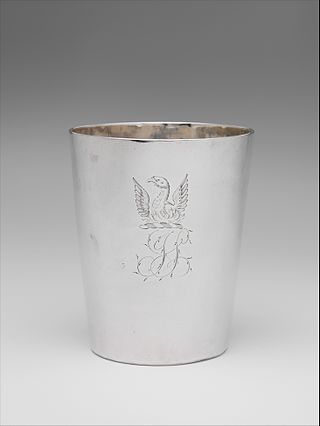
Benjamin Halsted, also spelled Benjamin Halstead, was an American silversmith active in New York City, Philadelphia, and Elizabeth, New Jersey. In 1794 he founded the first thimble factory in the United States.
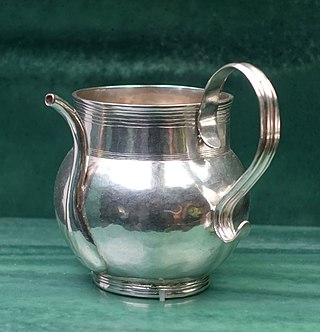
Samuel Haugh was an early American silversmith, active in Boston. Only three of his works are known to survive: two cups and a spoon.

William Homes, also spelled William Holmes, was an American silversmith, active in Boston. His son William Homes, Jr. was also a silversmith.
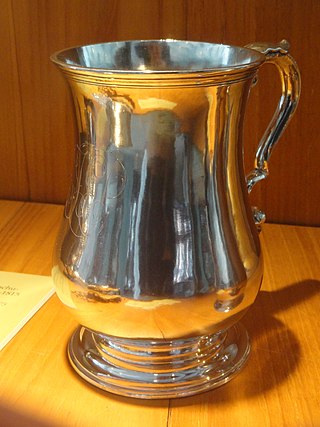
Joseph Loring was an American silversmith, active in Boston.

Samuel Minott was an American silversmith and retailer, active in Boston.

Daniel Parker was an American silversmith, active in Boston.

Apollos Rivoire, often known as Paul Revere I, was a French-American Huguenot silversmith, active in Boston. He was father to Paul Revere, the famous American silversmith and patriot.
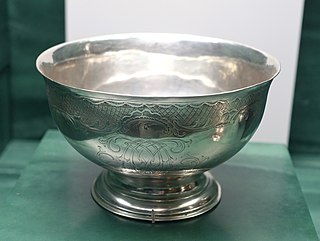
Joseph Richardson Sr. was an American silversmith, active in Philadelphia. He has been described as one of the greatest silversmiths of his time.

Samuel Edwards was an American silversmith, active in Boston.

Jacob Hurd was a leading American silversmith, active in Boston, and father to silversmiths Nathaniel Hurd (1729-1777) and Benjamin Hurd (1739-1781), as well as grandfather to Benjamin Hurd Jr. (1778-1818).
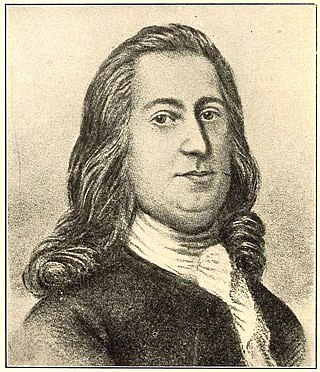
Daniel Henchman was a publisher and bookseller in 18th-century colonial Boston. Aside from his mainstay of publishing, printing, and bookselling, he was involved in a variety of mercantile pursuits. He was also very involved in Boston's civic matters and gave generously to the poor fund through his church. He was also an officer in the Boston militia regiment. Primarily through Henchman's efforts, the first paper mill to appear in New England was built in Massachusetts. Some historians consider Henchman to be the most prominent publisher and bookseller in pre-Revolutionary New England.




















